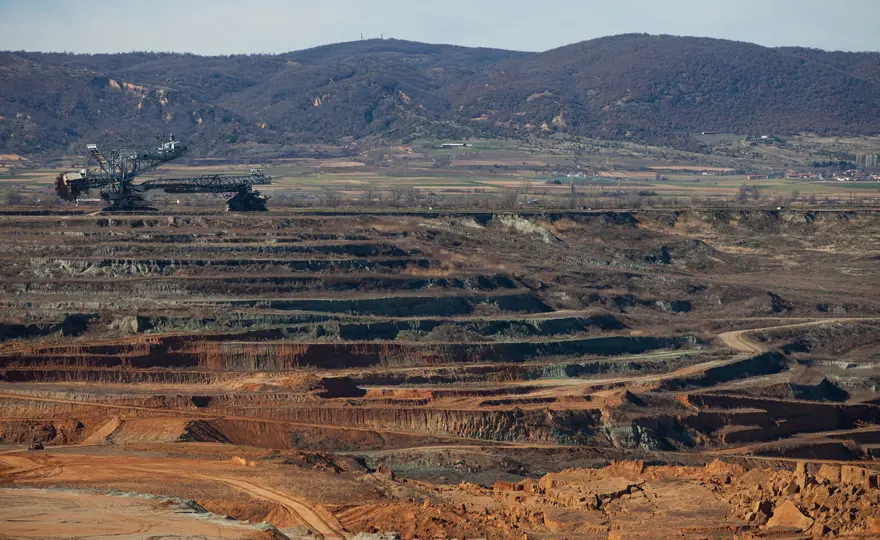ClientEarth Communications
11th September 2020


Germany’s coal phase-out contains a plan to decimate further villages – their residents are fighting back.
July saw Germany finally agree its long-wrangled coal exit law. But the law will allow Germany to continue burning coal until 2038 – and expanding coal mines in the process. .
This mine expansion comes at a cost beyond climate and nature: several villages, centuries old, will be swallowed.
Lignite mine Garzweiler II, in the west of Germany, is owned by energy utility RWE. It already covers an astounding surface area of 48km2 and as the German government heralds its energy transition, the villages of Keyenberg, Kuckum, Berverath and Westrich are set to be demolished, starting in 2023.
The land in the ‘Rheinische Revier’ is fertile and beautiful, and these villages are home to smallholdings and farms, many of which have been in the families that live on them for generations.
Norbert Winzen is part of the fourth generation to live on his family farm in Keyenberg. He said: “The farm has been the centrifugal force of my family since I was born. We are facing the loss of family homes and churches that are centuries old, the demolition of irreplaceable farmland and gardens, and the relocation of cemeteries.”
In September 2019, the villagers formed a public alliance, ‘Menschenrecht vor Bergrecht’ – meaning ‘human rights before mining rights’. They pledged to fight for their homes, all the way to court if they had to – with ClientEarth’s support.
Their legal challenge was originally set to be against any decision to formally dispossess them of their land – but when the coal phase-out law was agreed, the members of Menschenrecht vor Bergrecht were presented with another opportunity.
The German constitution secures basic rights for each German citizen – these include the right to dignity, to legal protection – and to property.
Logically speaking, this should mean that evicting people from their homes to make way for coal would infringe the right to property.
However, German mining law has long trumped this fundamental right, under the understanding that coal extraction is ‘in the public interest’. But in an era of climate change and clean energy, we believe mining lignite, the dirtiest form of coal, should not be considered to be ‘in the public interest’.
However, the coal exit law anticipated any debate over the matter by declaring the expansion of the Garzweiler mine to be ‘essential’, citing reasons of energy and economic security – namely, the expansion would be ‘in the public interest’. This unusual piece of legislation, named the ‘Garzweiler clause’, has been understood by many to have been an intentional move, guaranteeing RWE could lay claim to the villagers’ land, without fearing legal backlash.
But Menschenrecht vor Bergrecht’s lawyer Dirk Teßmer believes the provision is unconstitutional – failing to take into account villagers’ rights, and relying on an assessment of German energy security that has been roundly refuted.
So the group has lodged a constitutional court case to have the provision overturned. The case could put the whole coal exit in question.
Mr Teßmer said: “I can see no justification for giving the Garzweiler mine this ‘untouchable’ status in the coal exit law – we don’t have satisfying evidence that the mine really is indispensable. The law in its current form violates the fundamental rights of my clients while protecting climate-damaging lignite.”
Barbara Ziemann-Oberherr lives in Keyenberg, and co-founded Menschenrecht vor Bergrecht. She said: “Everyone needs to know that today, in the 21st century, people are losing their homes for coal mining, with the full approval of the German government. Our rights have not even entered into the equation in the writing of this law and that’s why we’re going to court. Our fight is just starting.”
The process of expropriation has been slow torture for the communities in the villages under threat. As businesses close and some residents bow to the relocation deals offered to them by coal utility RWE, village life has gradually withered. Meanwhile, cemeteries are deconsecrated and moved, and a key road into the village was destroyed, despite active protest. The villagers see this as intimidation.
This is why the ‘Solidargemeinschaft’ or solidarity group formed by the villagers fighting against the expropriations is so important. It guarantees that they will stay as long as it takes to win their fight.
Ms Ziemann-Oberherr has installed solar panels on her roof; the villagers have plans for local markets to relaunch. Regeneration is at the front of their minds.
For now, it’s over to the judges.